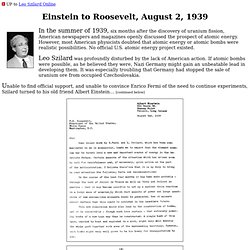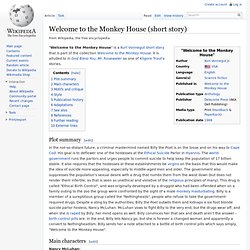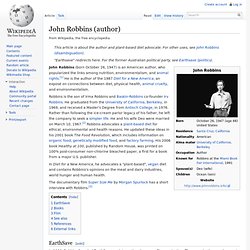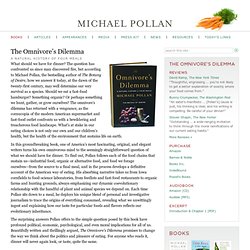

Watch A flaw that no one's talking about could kill Facebook. Einstein's letter to Roosevelt, August 2, 1939. UP to Leo Szilard Online In the summer of 1939, six months after the discovery of uranium fission, American newspapers and magazines openly discussed the prospect of atomic energy.

However, most American physicists doubted that atomic energy or atomic bombs were realistic possibilities. No official U.S. atomic energy project existed. Leo Szilard was profoundly disturbed by the lack of American action. If atomic bombs were possible, as he believed they were, Nazi Germany might gain an unbeatable lead in developing them. Unable to find official support, and unable to convince Enrico Fermi of the need to continue experiments, Szilard turned to his old friend Albert Einstein...
Szilard photo and Einstein letter courtesy Argonne National Laboratory Einstein was enjoying a sailing vacation in Peconic on the northern tip of Long Island, New York. Szilard explained the state of international research on uranium and the evidence that a bomb might be possible. Copenhagen . The Bohr Letters. Welcome to the Monkey House (short story) "Welcome to the Monkey House" is a Kurt Vonnegut short story that is part of the collection Welcome to the Monkey House.

It is alluded to in God Bless You, Mr. Rosewater as one of Kilgore Trout's stories. In the not-so-distant future, a criminal mastermind named Billy the Poet is on the loose and on his way to Cape Cod. His goal is to deflower one of the hostesses at the Ethical Suicide Parlor in Hyannis. The world government runs the parlors and urges people to commit suicide to help keep the population of 17 billion stable. Nancy McLuhan: Nancy McLuhan is a Hostess working at the Federal Ethical Suicide Parlor of Hyannis. Billy the Poet: Billy the Poet is a so-called nothinghead who refuses to take the ethical birth control pills and tries to seduce Ethical Suicide Parlor Hostesses. J. John Robbins (author) John Robbins (born October 26, 1947) is an American author, who popularized the links among nutrition, environmentalism, and animal rights.[1] He is the author of the 1987 Diet for a New America, an exposé on connections between diet, physical health, animal cruelty, and environmentalism.

Robbins is the son of Irma Robbins and Baskin-Robbins co-founder Irv Robbins. He graduated from the University of California, Berkeley, in 1969, and received a Master's Degree from Antioch College, in 1976. Rather than following the ice-cream parlor legacy of his father, he left the company to seek a simpler life. He and his wife Deo were married on March 10, 1967.[2] Robbins advocates a plant-based diet for ethical, environmental and health reasons. He updated these ideas in his 2001 book The Food Revolution, which includes information on organic food, genetically modified food, and factory farming. The documentary film Super Size Me by Morgan Spurlock has a short interview with Robbins.[3] Sam Harris.
Calvin ethics. The Omnivore’s Dilemma. What should we have for dinner?

The question has confronted us since man discovered fire, but according to Michael Pollan, the bestselling author of The Botany of Desire, how we answer it today, at the dawn of the twenty-first century, may well determine our very survival as a species. Should we eat a fast-food hamburger? Something organic? Or perhaps something we hunt, gather, or grow ourselves? The omnivore’s dilemma has returned with a vengeance, as the cornucopia of the modern American supermarket and fast-food outlet confronts us with a bewildering and treacherous food landscape. In this groundbreaking book, one of America’s most fascinating, original, and elegant writers turns his own omnivorous mind to the seemingly straightforward question of what we should have for dinner.
The surprising answers Pollan offers to the simple question posed by this book have profound political, economic, psychological, and even moral implications for all of us. Ethics wordly. Water (2005. The Monk and the Philosopher: A Father and Son Discuss the Meaning of Life (9780805211030): Jean-Francois Revel, Matthieu Ricard, John Canti, Jack Miles.